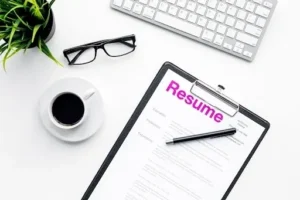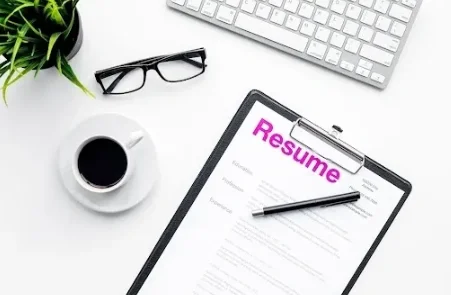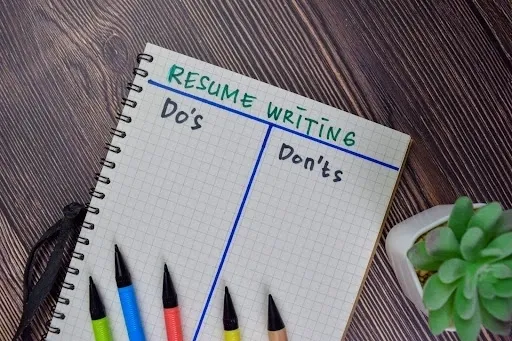Blog
15 Things To Leave Off Your Resume
Leave off the “objective” section.
They all tend to say similar things, -” seeking a position where I can utilize my skills and abilities.” Your resume should focus on what you have done and what skills you can bring to the company. Not the type of position you would like in the future. Replace the “objective” section with a “Professional Summary” section. This should be a high-level overview of your skills and accomplishments. It is likely the first thing Human Resource professionals and Recruiters will read, so you want it to grab their attention.
Leave off “references available upon request.”
It goes without saying that you will provide them if asked.
Leave off your references from your resume.
Having excellent references lined up is great and can be essential in the hiring process. However, this step isn’t done till the candidate is further along in the process. HR and Recruiters will not call your references before interviewing you, so there is no need to include it on a resume. Have your reference page handy for when they ask for it or bring it with you to the interview. In addition, bringing it with you to the interview can be used as a great marketing tactic to help you sell yourself.
Another reason to leave off your references on your resume is because of Applicant Tracking Systems. These systems are programmed to “read” resumes. They are looking for an email address and phone number. This information is then fed through the system so HR and Recruiters can easily view it. The Applicant Tracking System may think your reference information is yours if you have multiple phone numbers and email addresses listed. The only contact information on your resume should be yours, or you might miss out on great opportunities. Now, this is not common, but it is worth mentioning and not worth the risk.
Leave off high school information.
Why? Because it is assumed you graduated from high school. And to be honest, Human Resource professionals and Recruiters could care less about what high school you attended. They are more concerned with your college education. This brings me to my next point, if you did not attend college and only list the high school you graduated from, it draws attention to the fact that you do not have a bachelor’s degree. There is an exception to this rule; If you recently graduated from high school, you may add it. But even then, try to focus more on my skills and accomplishments over your high school education.
Leave off more than 15 years of experience.
Employers are most interested in your recent employment. It also helps to remove clutter. On the other hand, a couple of factors to consider before removing your older experience. For example, the industry, experience level, employer name, and title. If you held a great title with a well-recognized and established company, it is best to leave the title and employer name on your resume but leave off the duties and accomplishments.
Removing the older experience also helps to declutter your resume.
And removing older experiences helps to avoid age discrimination. Yes, I said it. Employers are not supposed to discriminate against age, but unfortunately, it happens. If your resume goes back 20-30 years, the hiring manager can figure out your age with some simple math.
Leave off personal hobbies and interests.
It may be tempting to want to show some of your personality on your resume, but really, it doesn’t belong on your resume. It is essential to fill your resume with important information like education, work experience, and qualifications.
Leave off long paragraphs.
Replace these with bullets. Human Resource Professionals skim hundreds of resumes a day. For some reason, a paragraph looks less appealing to read than bullet points.
Leave off pictures from your resume.
Why? Because your physical appearance is irrelevant when it comes to being able to do the job and getting hired. It also takes up valuable space that could be used for content. And not to mention, it is also illegal to discriminate based on appearance, so don’t put HR in a sticky situation and leave off your picture.
Leave off your salary information
There is no need to add this information. Sometimes the online application will ask for it, and in that case, put your salary information. And if the application asks for your desired salary, make sure to enter a reasonable expected salary range.
Leave off the reason
why you left your last job. This should be discussed during an interview, not on a resume. Also, make sure when talking about the reasons why you left your previous employers that you speak highly of them and refrain from speaking negatively.
Leave off things like race, religion, sex, national origin, sexual orientation, pregnancy, and marital status
on your resume. These are considered a “protected class” under the Title VII of the Civil Rights Act of 1964, which means employers cannot discriminate in the workplace, including hiring, firing, and promotions.
Leave off personal pronouns like “I” and “me”.
It is best practice to leave these off because it is understood that you are speaking about yourself.
Leave off an unprofessional email address.
The best type of email address is your first name and last name. If you have an email address like ‘[email protected]’, it’s best to skip that one. It only takes a few minutes to get a new email address that will professionally represent you. And you might consider using a separate email address for the job-hunting journey. One that you can use for applications and career-related communications only.

Please do not hesitate to reach out if you have any questions about what you should or should not include on a resume. The resume writers at NimoHR are here to help.
Latest Posts
- How to Write Engaging LinkedIn Articles That Build Your Brand
- How to Perfectly Align Your LinkedIn Profile with Your Resume
- How to Update Your Resume for 2025: Expert Tips from NimoHR
- Expert Resume Formatting Tips to Beat Applicant Tracking Systems (ATS)
- Industry-Specific CV Writing: Why One-Size-Fits-All Doesn’t Work
- How a Professionally Written CV Can Speed Up Your Job Search
- Why LinkedIn Profile Optimization is the Secret to Standing Out in a Competitive Job Market
- How a LinkedIn Profile Writer Can Transform Your Online Presence
- Enhancing Your Job Application: The Value of a Cover Letter Review Service
- Common Mistakes in Cover Letters and How Professional Services Can Help
- Overcoming Common Interview Challenges: Gaps in Employment and Career Transitions
- The Role of Non-Verbal Communication in Job Interviews
- Mastering the Salary Conversation: Essential Strategies for Effective Negotiation
- Choosing Between Quitting and Getting Fired: What’s Best for Your Career?
- Mastering LinkedIn Skills: How to Choose the Best Skills for Career Growth
- 5 Proven Strategies to Send LinkedIn Invitations That Get Accepted
- Crafting the Perfect Cover Letter for an Internal Position: A Step-by-Step Guide
- Did You Know? Your Resume Reference Page Could Make or Break Your Job Application
- Crafting a Layoff Notice: Effective Communication During Work Shortages
- Mastering Behavioral Interview Questions: Tips and Examples
- In-Demand Skills for 2024: What to Include on Your Resume
- Navigating Career Transitions: Reshaping Your Resume for a New Path
- How to Optimize Your LinkedIn Profile
- Cracking the Job Interview: Insights from NimoHR’s Interview Preparation Sessions
- Using LinkedIn Articles to Showcase Your Expertise
- Creating a Standout Resume for Phoenix Employers: Tips on crafting a resume tailored to the preferences of local Phoenix employers
- Resume Trends for 2024: What You Need to Know
- From First Impression to Final Question: Excelling at the Four Key Interview Evaluation Points
- Behind the Screens: Understanding the Role of ATS in the Hiring Process
- How to Create the Perfect Executive LinkedIn Profile?
- How to Write a Cover Letter That Gets You the Job You Want
- How To Build A Resume
- Get Professionally Written Resumes And LinkedIn Profiles
- Top 5 Reasons To Avail Of LinkedIn Resume Writing Services
- Helpful Tips For Writing A Perfect Cover Letter
- How to Ace Your Next Interview
- Applying Strategically and Networking
- Effective Interview Strategies
- The Best Job-Board Sites
- 4 Simple Signs That You Should Quit Your Job
- The most common interview questions & the best way to answer them
- How to beat those pesky Applicant Tracking Systems
- Jump-start your career during the COVID-19 crisis
- Questions to ask in an interview
- Career consulting ROI. Why you should purchase a professional resume writing services
- The Importance of a Company Culture and HR’s Role
- Why companies should offer outplacement services and career coaching
- Interview Tips: Back to the Basics
Categories
Related Posts

How to Write Engaging LinkedIn Articles That Build Your Brand
LinkedIn is more than a networking platform—it’s a place to share insights, build authority, and grow your personal brand. Knowing how to write engaging LinkedIn articles can amplify your voice, attract job opportunities, and establish you as an industry thought leader. Whether you’re working with a LinkedIn profile optimization service or looking to boost your… Continue reading How to Write Engaging LinkedIn Articles That Build Your Brand
Read More
How to Perfectly Align Your LinkedIn Profile with Your Resume
Why Alignment Matters Your LinkedIn profile and resume should tell the same story—but tailored for different audiences. While your resume is targeted toward specific job applications, your LinkedIn profile is a living, breathing summary of your career. In today’s job market, hiring managers often look at both. A mismatch can raise red flags. That’s… Continue reading How to Perfectly Align Your LinkedIn Profile with Your Resume
Read More
How to Update Your Resume for 2025: Expert Tips from NimoHR
Updating your resume for 2025 requires more than just listing your latest job. With applicant tracking systems (ATS) becoming more sophisticated, you need to format and write your resume strategically to stand out. At NimoHR, we specialize in helping professionals craft impactful resumes that pass ATS filters and impress hiring managers. If you’re ready to… Continue reading How to Update Your Resume for 2025: Expert Tips from NimoHR
Read More